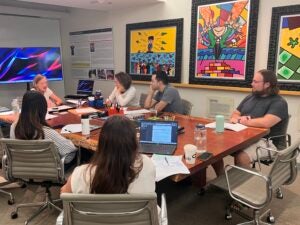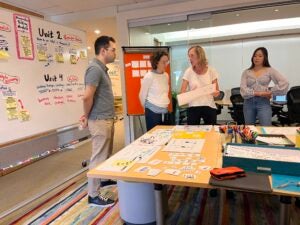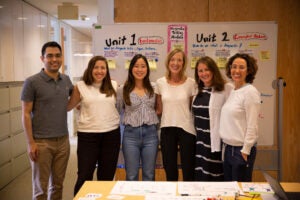Outbreak Science project collaborators convened for a full-day meeting to launch its project. The project focuses on high-school education in outbreak science, the study of emerging infections, epidemics, and pandemics. The meeting was attended by faculty, students, and collaborators from CHDS, the Global Health Education and Learning Incubator at Harvard University (GHELI), and the Broad Institute of MIT and Harvard.
The collaboration “spark” began two years ago when Professor Pardis Sabeti approached CHDS Faculty Director Sue J. Goldie about their active learning simulation platform that teaches students how pathogens spread and the impact of interventions. With a team of collaborators from multiple institutions, Sabeti and Goldie developed a roadmap for a curriculum for high school educators in formal and informal learning settings. They were fortunate to receive support from the Gordon and Betty Moore Foundation to develop a proof-of-concept modular course.
 CHDS is leading the module units on diagnostic testing, epidemiology, economic evaluation and mathematical modeling, GHELI is leading the units on social determinants, health systems, and global governance, and the Broad Institute is leading the units on infectious disease fundamentals, microbiology, genetics, vaccines, case studies, and emerging technologies. The CHDS Media Hub and GHELI are collaborating on the overall instructional design of short-form content, learning materials, instructor guidance, and a structured process to prototype, pilot, and field test.
CHDS is leading the module units on diagnostic testing, epidemiology, economic evaluation and mathematical modeling, GHELI is leading the units on social determinants, health systems, and global governance, and the Broad Institute is leading the units on infectious disease fundamentals, microbiology, genetics, vaccines, case studies, and emerging technologies. The CHDS Media Hub and GHELI are collaborating on the overall instructional design of short-form content, learning materials, instructor guidance, and a structured process to prototype, pilot, and field test.
 The meeting began with a presentation of background work on national and state-level learning standards led by CHDS and GHELI, which includes NGSS, insights from a systematic review of open-access existing educational materials, and a proposed structure for the instructional design approach. Broad participants informed the team of their companion textbook progress and updates made to the interactive capability for the Operation Outbreak simulation platform. The afternoon working meeting began with a gallery walk-through of pilot materials developed for the unit on diagnostic testing, and extensive discussion about how to meet the needs of a broad range of high-school learners. Janice Jhang, MPH student in Health Policy and Educational Innovation Scholar (supported by the Alan Colowick Innovation Fund) shared an update on her diagnostics module work with Goldie, which includes case-based exercises, in-class activities, and interactive assignments.
The meeting began with a presentation of background work on national and state-level learning standards led by CHDS and GHELI, which includes NGSS, insights from a systematic review of open-access existing educational materials, and a proposed structure for the instructional design approach. Broad participants informed the team of their companion textbook progress and updates made to the interactive capability for the Operation Outbreak simulation platform. The afternoon working meeting began with a gallery walk-through of pilot materials developed for the unit on diagnostic testing, and extensive discussion about how to meet the needs of a broad range of high-school learners. Janice Jhang, MPH student in Health Policy and Educational Innovation Scholar (supported by the Alan Colowick Innovation Fund) shared an update on her diagnostics module work with Goldie, which includes case-based exercises, in-class activities, and interactive assignments.

Broad attendees included Pardis Sabeti, Executive Director and Head of Science Education and Co-creator of Operation Outbreak, and Kian Sani, Program Manager and Advisor of Special Projects and Strategic Partnerships at the Broad Institute. Megan Harding, Associate Director of Educational Initiatives, Christina Fasano, Senior Faculty Coordinator, and Tim Winslow, Digital Content Creator, joined Sue J. Goldie from CHDS/GHELI.
Other collaborative partners for Operation Outbreak include Jamie Newman, Associate Dean, Louisiana Tech University, Andres Colubri, Professor Bioinformatics and Integrative Biology, UMass Medical School, Todd Brown, Inspire Project, Henry Ford Innovator Award, Congressional Teacher of the Year, Air Force STEM Teacher of the Year, and Ben Fry, Principal at Fathom, Faculty for Information Design & Visualization at MIT.
Learn more: Collection: Diagnostic Tests, Bayes, and COVID-19
Related news: CHDS Educational Innovation Scholar Update
